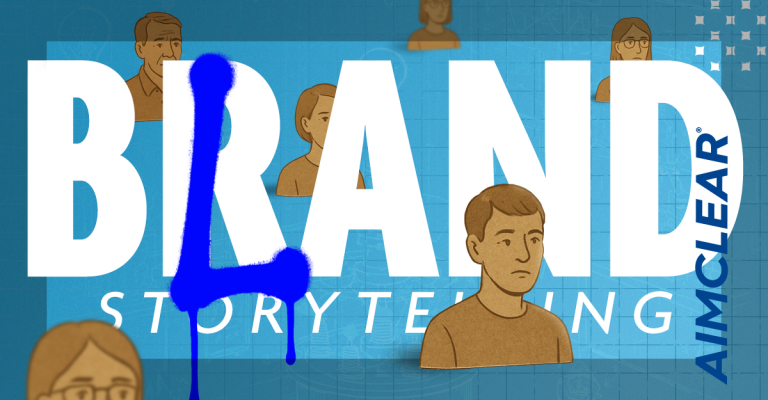I’ve recently had two transcendent experiences to further frame my now nearly 20-year career as an online marketer. First, I essentially stepped away from AIMCLEAR‘s offices in Duluth and Saint Paul for 6 months to write a book about Facebook Ads. Then, literally as the book was completed, I had heart damage fixed. During cancer treatment over five years ago, my aortic valve was seriously impacted by chemo and radiation. Both the book project and open-heart surgery took me away from my decades-long daily study of SEO for weeks at a time. Both experiences turned out really well, were essential and deep, made AIMCLEAR an even better company, and provided me with magnificent perspective I would not have realized by other less extreme experiences.
Any CEO, whose company grows over five years from only him to approaching 20 souls, needs to trust the team. I knew AIMCLEAR was totally cool because now, these years later, we’ve got an office full of brilliant SEO brainy-types who practice state-of-the-art social, PR, SEO, PPC mashup strategies and tactics with vigor, wit and thought leadership. After each chunk of time away, the team briefed me so I never got personally very far out of sync with SEO changes. From daily vicissitudes in Facebook, YouTube template changes to Google’s +1, I asked for and received comprehensive studies from our team whenever anything important evolved. Still, being away from my beloved SEO study broke my heart. Well, it was broken already. The whole thing was very ironic.
Still, temporarily stepping aside made me a much better marketer. The unexpected silver lining was that constantly returning to SEO news tuned out to be a bit like perspective gained by a lonely parent who rediscovers his children after weeks away at summer vacation camp. Though I was (truly) stunned at how significantly SEO had changed each block of time away, not too much had changed at all.
In fact now that I think about it, not much has not changed at all since the days of “Fetch,” “Archie” and my hot little 14.4k Modem (V.32bis) (2400 baud) modem. Heck, not much of marketing’s essence has changed for hundreds of years. As I wrote Killer Facebook Ads, the book became much more about marketing, beyond just Facebook Ads. After completing the book, the sabbatical from the daily SEO grind to repair my heart gave me some unpressured time to assimilate things, to think and I felt inspired to see things clearer than before. SEO is ever new and barely ever changes. Long Live SEO! This is the first installment of two, the second half of which will be published later this week.
1. SEO Is About Operating On Brand Quality, Not Just Algorithmic Discoverability
Sure: tags, shares, CMS structure and links are critical, but it takes an awesome new product to overtake an established brand. Customers don’t buy tags and shares. They purchase products that work and services that solve needs. Links and shares come from creating wonderful products, promoting the products, and finding customers who care. Just because it’s “SEO” does not mean the fundamental precepts of marketing are any different then they have ever been. SEO is a marketing channel tactic, not a strategy.
Marketers like to get angry because search engines seem to give established brands big breaks. Yep, it sure is hard for new brands to break through. Dude, it should be that way. The reason search engines make it hard for new brands is because awesome new brands are actually pretty rare. Arguably, it should be hard to break through. It’s always been this way. I heard from my mentors that in 1965, as a ma’ and pa’ appliance shop, it was pretty darned hard to take on Sears®, selling washing machines and stoves in Minneapolis neighborhoods, too. Things really have not changed very much in the Internet age.
It’s just that now entitled SEO practitioners complain, spoiled by the long lost days when, for just a minute in history, mediocre products could win by algorithmic manipulation. You know what? Get over it!
The timeless marketing axiom is that you can’t wrap a turd up in a bow and expect customers to keep buying the product. Mastering the algorithm in any organic era or publishing environment won’t fix a terrible product, even after prominence is gained. Lies are discovered and half-truths backfire. Having access to a printing press, fax machine, email or Facebook Page could never help if the product sucks. The only real wealth to be gained is the creation of valuable brands, timing, hard work and luck. After these attributes, organic prominence comes next. “Real” SEO is about understanding the imperative need to nurture the evolution of brand equity based on marketplace feedback.
Yes, SEO is about discoverability without paying the engine, but sure-footed SEO marketing starts with having awesome products that customers want. Truly great marketers will be truly great in any era and transcend the channel of the day. A brand can buy any flavor-of-the-month channel distribution expertise. It’s much harder to develop fabulous ideas and differentiating creative concepts that highlight and flatter the true value that makes a brand, new or otherwise, a perfect match for the community’s needs.
2. SEO Without Research Is Like The Tin Man, A Body With No Heart
Content without understanding what customers want is a little like peeing in the wind with your eyes shut. It’s possible to thread the needle in a vacuum, but success without research seems to be very rare. The “caterer” who discovers the keyword “gourmet food delivery Manhattan” has found a market segment that is potentially product defining. The Facebook community manager who discovers 12,630 users who are fans of a certain complimentary website have a place to go, to hang out, network and make new friends.
In the old days we called hotel room gatherings to decide on logo colors, marketing message “focus groups,” and Neilson used survey books. Now, from search to social, we have more empirical methods to understand what customers want and what words they use to express certain things or intentions. It’s a fine new age of data-driven market research. Research is the all-knowing king and content is the all-powerful queen sitting equally at his side.
3. Great SEO Content Is The Natural Result Of Authentic Value
Now that “liking,” “sharing,” rebroadcasting and other social signals have joined links, semantics and trust as primary SEO elements, there’s a lot of talk amongst marketers that recurrent and brilliant content to traffic and promote is essential. As it happens, this reality has been the same for centuries.
Brands win when they start with the principle questions:
- “What must we give our customers to demystify the process, preemptively remove barriers, and support the process of becoming and being our customers?”
- “What can we leave behind for potential customers that will clearly incent them to return and buy?”
- “Are we willing to give until it hurts?”
- “Are we as marketers willing to create content that teaches customers to fish, without giving away the fish bucket?”
- “How can we pay it forward with new customers to keep their faith and loyalty?”
These truths have nothing to do with SEO. Soft, magnanimous and benevolent touches are immortal when it comes to content.
4. Understanding Circulation Is Key
When it comes to the distribution of content, broadcast and rebroadcast, adopt early and adapt often. Distribution paradigms change daily. Present-day distribution networks, how they piggyback and dovetail, are the dominant concept to stay current with and master. Facing the brutal reality of what you do and don’t know about how content circulates amongst people is fundamental. This applies not only search engines themselves, but components of user behavior that search engines see as signals. Who saw tweets coming as important social signals to search engines? To those early adopters who invested time in building huge networks of authentic Twitter friends… go the spoils.
However, make no mistake. The distributed mashup of search and social is not new, nor is the notion of word of mouth circulation effecting brand “prominence.” SEO has always been social. From banks to beauty parlors, humans have always been recommendation “engines” propagating clues. It’s just that these days, it’s much easier for search engines to measure social and the sampling is finally enormous enough for databases of clues to be reliable.
Whether it was five women lawyers chattering between 1997 board meetings about how “cool” the new paper magazine is or 2,024,805 folks who like American Express on Facebook today, SEO has always been about word of mouth propagating brands. It should come as no surprise that as humans have flocked to social, search engines use the data to signal importance of content in SERPs. The new ecosystem of social media channels represents the human-sampled distribution channels of the day. Then or now, be it by little black book or PRWeb, keeping up to speed on distribution matters.
Looking To Part Two
The more SEO changes, the more it stays the same. Later this week, we’ll publish The Heart Of SEO: 8 Everlasting Truths Part-Two. Until then, happy optimization, and it’s great to be back!









